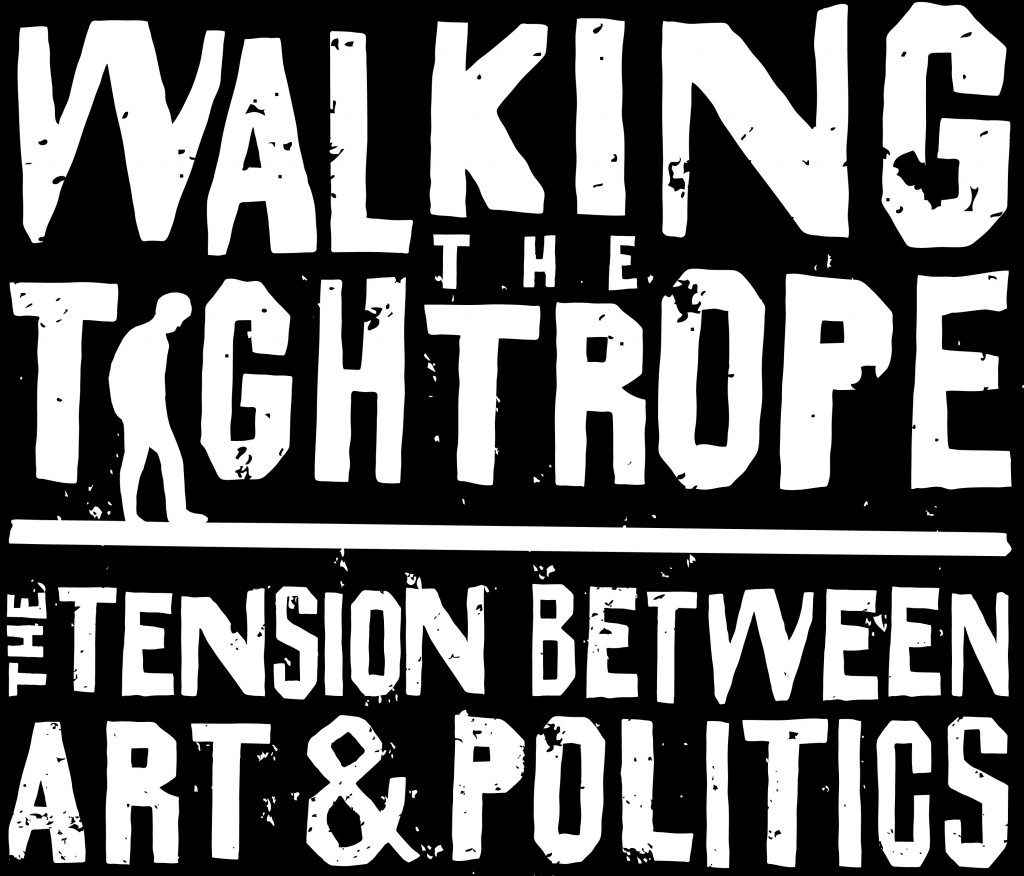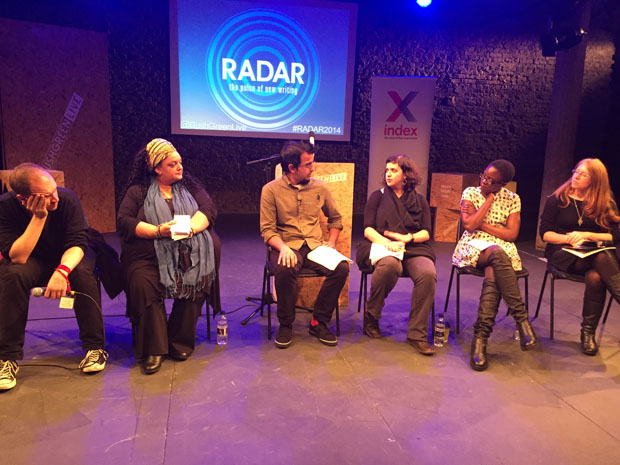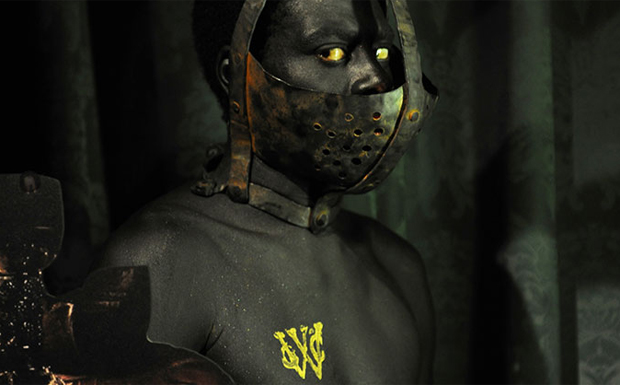19 Jan 2015 | Events

Presenting the world premiere of a collection of 12 explosive political five minute plays by writers including Mark Ravenhill, Neil LaBute and Caryl Churchill.
Arising from events and decisions relating to The Underbelly and Incubator Theatre’s The City, Exhibit B and the Barbican, and The Tricycle Theatre.
Each performance will include all twelve five minute plays and a lively post-show discussion exploring freedom of expression in UK arts today. Engage in discussion with the commissioned writers and a range of free expression advocates .
The post-show debate on on Friday 30th January will feature Index on Censorship CEO Jodie Ginsberg.
WHERE: Theatre Delicatessen, London, EC1R 3ER
WHEN: Monday 26th – Saturday 31st January, 7:30pm & Sat Matinee
TICKETS: £15 / £12 – available here
This event is produced by Offstage Theatre, in association with Theatre Uncut, and supported by Index on Censorship and Free Word.
15 Dec 2014 | ArtFreedomWales, News and features, United Kingdom
Index on Censorship has been exploring artistic freedom of expression and contemporary forms of censorship in the UK. Who or what controls what is sayable in the arts? Who has a voice in the arts? Do the answers vary as we move around the different member nations of the UK?
Looking at our culture through the prism of artistic freedom of expression opens up questions about the power relations between artists, venues, audiences, the police, the media and community interest.
Our initial case study Beyond Belief – theatre, freedom of expression and the police offered insight into how these relationships are often played out in the present day. Deepening our exploration, conferences in London in 2013 and Belfast in early 2014, have been followed by a programme of work in Wales in the latter half of this year. Art Freedom Wales was Index’s exploration of whether Wales is enjoying its right to artistic free expression.
Across all three projects, it is becoming clear there are massive pressures on what is sayable in the arts–rifts around what is acceptable to funders, to the audience, to public opinion, or even health and safety. It is also clear that there are significant questions around the issue of access to artistic expression–for established and aspiring artists, as well as the public at large. Events this past summer at the Barbican around Brett Bailey’s Exhibit B have underlined recurring questions around the role of the police and the media in shaping what gets to be seen.
In 2015, Index is planning to explore the state of artistic freedom in Scotland before holding a state of the nations event which will bring together key players to discuss how to reinforce support for artistic expression across the UK.
ArtFreedomWales
Over the past few months Index’s project ArtFreedomWales has hosted a series of online discussions with artists from across Wales–established artists, emerging artists and artists working in Welsh. You can catch up with everything that’s been said here.
These discussions, and the issues they raised, informed our approach to a Free Speech Hearing in Cardiff on 27 November. As a culmination of the project, the hearing invited practitioners from across art forms alongside policy makers and cultural gatekeepers to come together to discuss the question “Is Wales enjoying its right to freedom of artistic expression?”
To open the hearing, Index invited Turkish playwright Meltem Arikan, an established artist, with direct experience of censorship who is now living in exile in Wales, to survey the Welsh arts scene from the eye of an outsider.
This was followed with an array of evidence volunteered from across Wales, short presentations surfacing a number of topics from offence to rumour, and self-censorship to cultural education.
Moving from the stage to discussion between peers, major themes and concerns were examined in more detail in breakout sessions.
Finally, a panel discussion featuring Dai Smith (Arts Council Wales), John McGrath (National Theatre Wales), David Anderson (Museums Wales), Lleucu Siencyn (Literature Wales) and Elen ap Robert (Pontio) asked how leading organisations in Wales might take on some of the issues raised during the afternoon?
This article was posted on Dec 10, 2014 at indexoncensorship.org
14 Nov 2014 | Europe and Central Asia, Events, News and features, United Kingdom

(Photo: Melody Patry)
Should there ever be censorship of the arts was the subject of an Index/Bush Theatre debate, held last night. The event was provoked by the cancellation of Exhibit B in London, and Israeli play The City at this year’s Edinburgh Festival Fringe as well as controversy around this year’s Jewish Film Festival, all in the past few months.
Taking part in the debate were, among others: Stella Odunlami, artist and a cast member of Exhibit B; Zita Holbourne, artist, activist and co-organiser of the campaign to boycott the show; and Arik Eshet, artistic director of Incubator Theatre, which produced The City.
An Exhibit B performer Stella Odunlami told the audience: “We, a group of intelligent and informed actors and performers, have been censored and silenced by protestors, who truly have an ill-informed and misguided perspective of this significant and informative piece of work.
We are appalled, outraged, angry…extremely angry as artists, as human beings. We cannot believe that this is London in 2014. We are appalled that Exhibit B has been cancelled because of the actions of some of the demonstrators.”
Protester Zita Holbourne put her point of view as a poem, she said: “We said to them, Barbican please take that down, 2014 and you want to put black people in a cage? Then telling us you don’t understand our outrage!”
Read their full statements, made to the audience, below.
Stella Odunlami read the statement from the London cast of Exhibit B
It is with utter disappointment that we write these words.
Exhibit B is an important work that has given us an education into the lives of other human beings. We believe everybody has the right to their specific story being told, and this work provided that platform, through the medium of art – living and breathing. It is a shame that these stories will no longer be heard, seen, nor felt. An even greater shame that those who were open and brave enough to purchase a ticket, have now been robbed of that experience.
Exhibit B afforded us the opportunity to explore and engage with our past, while reminding and reawakening us to its impact on the present.
To the 23,000 petitioners who complained that Exhibit B objectified human beings – you missed the point.
This is the 21st Century and we believe that everyone has a choice, a right, an entitlement, to do or say whatever they deem to be right for them. We can accept someone seeing the piece and not liking it-that’s fine. What we cannot accept about the events of Tuesday evening and the subsequent cancellation of Exhibit B, is the physical action that was taken outside of the Vaults, by a minority of the demonstrators who would not even entertain the thought of seeing the piece.
We, a group of intelligent and informed actors and performers, have been censored and silenced by protestors, who truly have an ill-informed and misguided perspective of this significant and informative piece of work.
We are appalled, outraged, angry…extremely angry as artists, as human beings. We cannot believe that this is London in 2014. We are appalled that Exhibit B has been cancelled because of the actions of some of the demonstrators.
We are artists who, after thoughtful and careful deliberation, decide what projects we want to work on. Grown men and women who decided that our contribution to Exhibit B would be worthwhile and important. Who, on Tuesday, were told, by way of the protestor’s force, that we couldn’t make creative and life decisions for ourselves.
That complete strangers knew what was best for us.
For all of us.
Our voices and ideas were deemed not worthy of being shared with the world. This is exactly what Exhibit B is about: we want to denounce oppression, racism and bigotry. We want to denounce actions like this. And the fact that this is still happening in London in 2014, proves even more why this piece is necessary.
The anger and vitriol and hysteria which the protestors have and continue to level at the company of Exhibit B, astounds us.
It doesn’t feel rational. It doesn’ t feel measured. There simply has not been room for an exchange of ideas.
There’s such vulnerability in holding a mirror up to humanity. No one wants to see a representation of themselves oppressed, but it doesn’t mean that we shouldn’t look.
We welcome protest, but surely it’s best to have as much information beforehand, so your opinion is truly informed. Surely as a protestor, you have a duty to ensure your ‘peaceful protest’ really is peaceful. And, surely your right to protest should not impact another person’s freedom of thought and speech.
We are actors and performers who believe that art should be meaningful. Challenging. Provoking.
Not only for us, as participating collaborators in the work, but also for the audience who witness the work.
This project afforded us the opportunity to be the most vulnerable, most on display, silently engaging and being engaged, while exploring themes around other, sex, race, and gender.
Exhibit B was created with love and sensitivity. We are intelligent creatives who made a brave choice to be part of a thought provoking piece of work. As Londoners, we are embarrassed that this has happened in our city, as the show has already been seen by 25,000 people from all over the world, and will continue to tour.
We would like to thank the Barbican for their immense support and Brett Bailey for his inspired work.
Zita Holbourne read Prejudice, Privilege, Power: A Poem for the Barbican (listen to it here)
Barbican announced a human zoo in town
We said to them, Barbican please take that down
2014 and you want to put black people in a cage?
Then telling us you don’t understand our outrage!
Strapped to plane seats, placed in iron masks
And nobody in a whole arts institution thought to ask
Our views before taking a decision to host
Then you have the bare faced audacity to boast
That you’ve placed black people in a human zoo
Going around talking about the good it can do
In challenging racist attitudes and views
But to listen to our concerns you refuse
Shackles and cages at £20 per ticket
But you don’t get why we organised a picket
We don’t need to see a black woman shackled to a bed
To know that racism is rearing its ugly head
We’re forced to battle daily with modern day enslavement
Power and privilege versus our self-empowerment
You are arrogant telling those of us that live with racism every day
What is or is not racist, like we don’t have a say
Let’s make clear that a boycott campaign is not censorship
For your actions and failures you must take ownership
We don’t need a lecture on what it is to be banned
We’re treated like third class citizens in this land
Blocked by institutions, so take a moment, pause
Think about the anger and pain you cause
By insulting our ancestors, our histories
Adding insult to our multiple injuries
If anything is censored it’s the art we produce
Rejected repeatedly by art institutions that refuse
To acknowledge our stories told by us through art
We’ve never had a level playing field from the start
We have a legitimate right to protest
It’s disingenuous of you to suggest
That our demonstration was aggressive
When it was simply passionate and expressive
Using the very arts that you claim to stand for
To demonstrate our strength of feeling outside the door
We made music, danced, lifted our voices in song
Displayed placards that had our beautiful art on
Yet you state that we were extreme and threatening
In contrast, press there say we were peaceful and welcoming
Police confirm there was no damage, injury or arrest
So perhaps it’s you trying to censor our right to protest
Their singing was threatening is what the headlines say
Brandishing placards and drums that barred the way
You accuse us of blocking freedom of expression
But then you call our expression aggression!
What does this say about you as a leading arts institution?
When you resort to this vicious persecution
Barbican you are cowardly and insincere
Resorting to this malicious smear
You simply confirm what we said from the start
You are defending racism in the name of art
When prejudice, privilege and power are combined
Institutional racism becomes clearly defined.
Arik Eshet, Artistic Director of Incubator Theatre, spoke via Skype about the cancellation of The City at the Edinburgh Fringe Festival
The Index/Bush Theatre debate was part of the RADAR Festival.
This article was posted on 14 November 2014 at indexoncensorship.org



